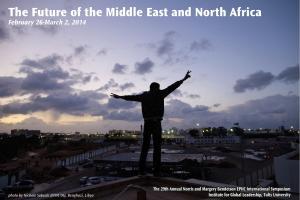 On Sunday we attended this annual event at Tufts University. This year’s topic was the Middle East and North Africa. The six-day symposium hosted around fifty international visitors. (Our daughter Elizabeth made a presentation, see below).
On Sunday we attended this annual event at Tufts University. This year’s topic was the Middle East and North Africa. The six-day symposium hosted around fifty international visitors. (Our daughter Elizabeth made a presentation, see below).
The morning speaker was Nicholas Burns, former U.S. diplomat and high State Department official, currently at the Kennedy School.

Nicholas Burns
He invoked America’s tradition of supporting people struggling for democracy, but also acknowledged a tension between such ideals and security interests. The Mid East is not a single entity, and policy must be individually tailored to each Arab country. Thus we did support democracy in Tunisia, Libya, and Egypt; but in Bahrain, not so much. A concern there was buffering Iranian power.
Egypt is a dismaying case – right back under an authoritarian military regime (maybe even more repressive than Mubarak’s), outlawing the nation’s largest political group. Not smart, Burns said, if you’re trying to unite the country. (Egypt’s regime is actually not trying to do that.) Burns thinks America should do more to nudge Egypt’s regime toward democratization.
I consider overdone the notion of security concerns conflicting with democratic advancement. In the longer, larger view, U.S. security interests are best served by a more democratic world (a democratic Russia wouldn’t do what it’s doing today; nor, indeed, would a democratic Syria); and by our being perceived as a true supporter of people’s democratic aspirations.
Regarding Syria, Burns thinks America missed a big opportunity a couple of years ago in failing to materially support the revolution (see my 2/5/12 post); and another when President Obama failed to punish Assad for crossing his “red line” on chemical weapons (see my 9/11/13 post). Burns was scathing about an international community that thinks it can do nothing about Syria; and about America’s too long trying to work with the Russians who’ve given us nothing. Russia and China have used their Security Council vetoes to block even humanitarian aid to Syrian victims. When, he queried, will there come Syria’s “Srebrenica moment” – recalling when atrocities in Bosnia finally shamed the international community – led by the U.S. – into forceful action, including a bombing campaign, to finally resolve the situation in 1995 (with a 1999 Kosovo repeat) – sidestepping the UN where similarly Russia’s veto protected Serbian aggression. Burns said that in Syria we should likewise go around the UN and intervene, at least to create humanitarian corridors, with a coalition that many Arab states would join.

And so, Ukraine — whose “profound crisis” Burns felt compelled to address despite the conference focus on the Arab world. He ruled out direct military engagement against Russia, as far too dangerous, but otherwise called for the assertion of confident American leadership, using every possible means to “dishonor” Putin, including expelling Russia from the G-8.
During the question session, an attendee from Russia bridled at the negative characterization of Putin; actually denied that Russian troops had entered Ukraine’s territory; and said Burns was wrong about Russia blocking humanitarian aid in Syria. She cited a Security Council resolution ten days earlier, authorizing such aid, with both Russia and China voting in favor.
Burns responded that, yes, such a resolution had passed; but so watered down by Russia and China that it was toothless and meaningless. He called this one of the most cynical actions in UN history.
I wonder, had Obama manned up on Syria, would Putin now have been emboldened to invade Ukraine? This is why projection of weakness is so dangerous – more dangerous, in fact, than resolute action. Wimping out on Syria may well have bought us an even nastier problem. So often in such matters, avoidance of costs today only means greater costs tomorrow.
Russia claims it’s only acting to protect its people — against nonexistent threats. Then there’s all the hysterical rhetoric about “Nazis” in control in Kiev put there by a Western conspiracy. Even if these ludicrous lies were true, Russia’s military aggression would make no sense. The Russians are drunk on military testosterone.

Curt Rhodes
In the afternoon session, Curt Rhodes, founder and leader of Questscope (an NGO helping vulnerable young people in the Mid East) gave a truly eloquent description of what it means to be a refugee. And Elizabeth Robinson discussed her summer visit to the Za’atari refugee camp in Jordan, holding 85,000 displaced Syrians, where she researched the camp’s economic life.

Elizabeth Robinson
She had interviewed the camp’s head, Kilian Kleinschmidt, working for the UN, which has taken over responsibility from Jordanian authorities. Kleinschmidt is trying to make Za’atari a different kind of refugee camp, where the inhabitants themselves are empowered by having more say about what goes on.
It may be noted that the 85,000 in Za’atari actually comprise less than 1% of all those made refugees by Syria’s conflict – a number now approaching half the country’s population. These are real people, no different from you or me. Imagine what it means, what it feels like, to lose every aspect of normal life. And to the 9+ million refugees, of course, must be added the 140,000+ killed; at least 11,000 of them starved and tortured to death in the regime’s dungeons. Srebrenica moment? I guess the world now has a greater capacity for shame than in the ’90s.
Assad continues to insist he’s fighting terrorists. Syria must be populated almost entirely by terrorists to necessitate air-dropping barrel-bombs in crowded urban centers. Reportedly, Assad was recently asked, by his children, why all the violence? He replied, “Because there are bad people in the world.”

Inger Andersen
Happily, the afternoon ended on a hopeful note, with a talk by Inger Andersen, a World Bank Vice President. Talking about the Arab Spring, she stressed that revolutions take time, and we should not lose heart over setbacks. Andersen saw real progress happening in some of the countries, notably Tunisia, Morocco, and Yemen. But, while there’s been a political awakening, economic awakening is a tougher thing. In any major transition, growth can be expected to slump, and the Arabs face a double crisis: the original economic dysfunction, compounded by the uncertainty and other fallout of abrupt change. However, Anderson saw opportunities for big benefits just from opening up and simplifying the business climate, though entrenched “rentier interests” will resist. And ultimately, political reform that cements citizen rights and pluralism will promote economic growth. Andersen said that a spirit of freedom has been released in many Arab hearts and minds, and she sees a region transformed, with a newfound optimism for the possible.
